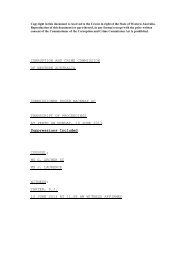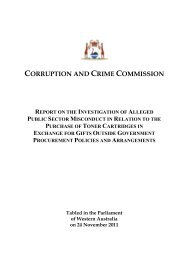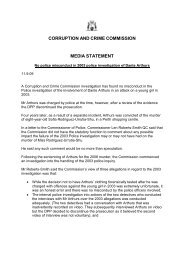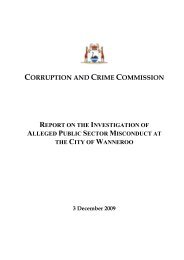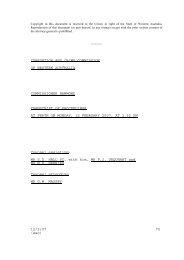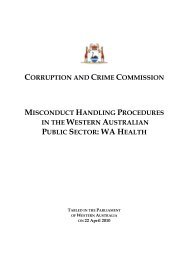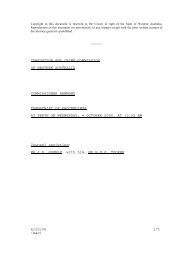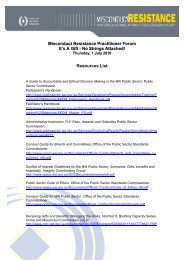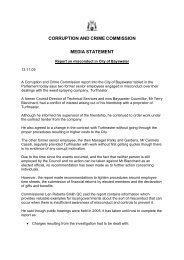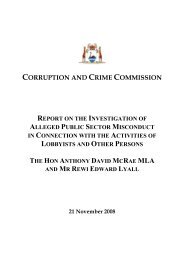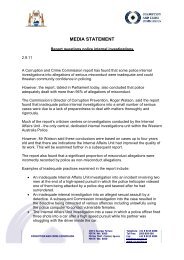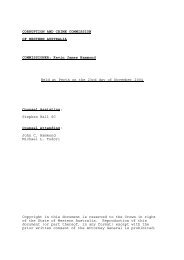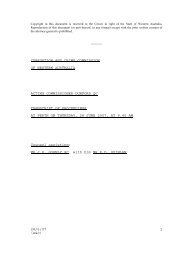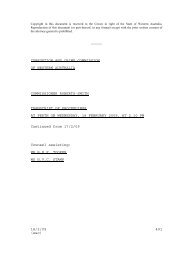DPI: Misconduct by Authorised Vehicle Examiners - Corruption and ...
DPI: Misconduct by Authorised Vehicle Examiners - Corruption and ...
DPI: Misconduct by Authorised Vehicle Examiners - Corruption and ...
Create successful ePaper yourself
Turn your PDF publications into a flip-book with our unique Google optimized e-Paper software.
does, however, provide a guide to what may amount to corruption in the<br />
circumstances of that case.<br />
[71] Re Lane (unreported, Supreme Court, Qld, Ryan J, 9 October 1992)<br />
concerned legislation pursuant to which a public officer could lose their<br />
superannuation entitlements if they committed an act of corruption. As to<br />
the meaning of corruption Ryan J said:<br />
In my opinion, in this context it means conduct which is done deliberately<br />
<strong>and</strong> contrary to the duties incumbent upon the person <strong>by</strong> virtue of his public<br />
office, as a result of which the person has sought to gain an advantage for<br />
himself or another.<br />
I consider that the word “corruptly” is not to be equated with “dishonestly”,<br />
<strong>and</strong> that dishonesty does not necessarily connote corruption, but if a<br />
person who holds a public office dishonestly applies public moneys to his<br />
own use, then his conduct is properly describable as corruptly using a<br />
public office held <strong>by</strong> him.<br />
I accept as correct the submission made on behalf of the respondent that it<br />
is necessary to find a conflict between duty <strong>and</strong> interest before one can find<br />
a corrupt performance or non-performance of public duties. But if a person<br />
uses a public office which he holds so as to dishonestly apply for his own<br />
benefit public funds, he has allowed his own private interest to override his<br />
public duty to apply the funds only for public purposes, <strong>and</strong> his conduct is<br />
corrupt.<br />
(emphasis added)<br />
[72] Thus for Ryan J the essence of corruption was the dereliction of public<br />
duty. The judgment of Ryan J in Re Lane was cited with approval <strong>by</strong><br />
Higgins J in DPP (Cth) v Hogarth (1995) 93 A Crim R 452. It is of course<br />
important to appreciate that the interpretation of particular words (such as<br />
“corruptly”) can be very case-specific, <strong>and</strong> turn on the particular legislative<br />
context <strong>and</strong> the facts of the case.<br />
[73] Nonetheless, another decision that provides a useful insight into the<br />
meaning of the phrase “acts corruptly” is that of the Federal Court of<br />
Australia in Williams v R (1979) 23 ALR 369. That case involved an<br />
appeal from the ACT Supreme Court. At trial the appellant was convicted<br />
of conspiring to cause a police officer to act corruptly. His defence was<br />
that he had paid the police officer the money so as to encourage him to<br />
investigate the complaint (against the appellant) properly because he had<br />
been “framed”. In deciding the case it was important to assess the<br />
meaning of the phrase “acts corruptly”. Blackburn J (with whom St John J<br />
agreed) expressed this opinion about the meaning of the phrase, at 373:<br />
The word has, in my opinion, a strong connotation of misconduct, i.e.,<br />
dereliction of duty, whether <strong>by</strong> act or omission. To that extent, the scope of<br />
the section resembles that of the common law offence of bribery, which<br />
implied the intention to procure a breach of duty on the part of the official<br />
bribed.<br />
(emphasis added)<br />
15



